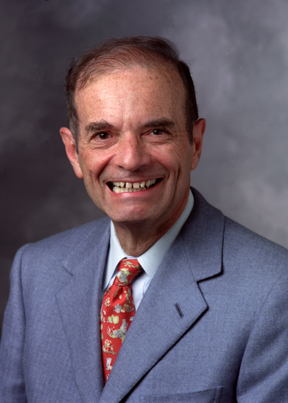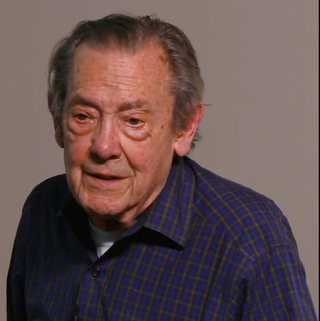Related Research Articles

Dudley Robert Herschbach is an American chemist at Harvard University. He won the 1986 Nobel Prize in Chemistry jointly with Yuan T. Lee and John C. Polanyi "for their contributions concerning the dynamics of chemical elementary processes". Herschbach and Lee specifically worked with molecular beams, performing crossed molecular beam experiments that enabled a detailed molecular-level understanding of many elementary reaction processes. Herschbach is a member of the Board of Sponsors of the Bulletin of the Atomic Scientists.

Donald Kennedy was an American scientist, public administrator, and academic. He served as Commissioner of the U.S. Food and Drug Administration (1977–1979), President of Stanford University (1980–1992), and Editor-in-Chief of Science (2000–2008). Following this, he was named president emeritus of Stanford University; Bing Professor of Environmental Science and Policy, emeritus; and senior fellow of the Freeman Spogli Institute for International Studies.

Robert Morris Sapolsky is an American neuroendocrinology researcher and author. He is a professor of biology, and professor of neurology and neurological sciences and, by courtesy, neurosurgery, at Stanford University. In addition, he is a research associate at the National Museums of Kenya.
Stephen Michael Kosslyn is an American psychologist and neuroscientist. Kosslyn is best known for his work on visual cognition and the science of learning. Kosslyn currently serves as the president of Active Learning Sciences Inc., which helps institutions design active-learning based courses and educational programs. He is also the founder and chief academic officer of Foundry College, an online two-year college.

National Institutes of Health Director's Pioneer Award is a research initiative first announced in 2004 designed to support individual scientists' biomedical research. The focus is specifically on "pioneering" research that is highly innovative and has a potential to produce paradigm shifting results. The awards, made annually from the National Institutes of Health common fund, are each worth $500,000 per year, or $2,500,000 for five years.

Lubert Stryer is the Emeritus Mrs. George A. Winzer Professor of Cell Biology, at Stanford University School of Medicine. His research over more than four decades has been centered on the interplay of light and life. In 2007 he received the National Medal of Science from President Bush at a ceremony at the White House for elucidating the biochemical basis of signal amplification in vision, pioneering the development of high density microarrays for genetic analysis, and authoring the standard undergraduate biochemistry textbook, Biochemistry. It is now in its ninth edition and also edited by Jeremy Berg, John L. Tymoczko and Gregory J. Gatto, Jr.
Joel Ephraim Cohen is a mathematical biologist. He is currently Abby Rockefeller Mauzé Professor of Populations at the Rockefeller University in New York City and at the Earth Institute of Columbia University, where he holds a joint appointment in the Department of Earth and Environmental Sciences, the Department of Ecology, Evolution and Environmental Biology, and the School of International and Public Affairs. He is also a member of the Council on Foreign Relations.
Vamsi K. Mootha is an Indian-born American physician-scientist and computational biologist. He is an Investigator of the Howard Hughes Medical Institute, Professor of Systems Biology and Medicine at Harvard Medical School, Investigator in the Department of Molecular Biology at Massachusetts General Hospital. He is also an Institute Member of the Broad Institute.
Samuel Karlin was an American mathematician at Stanford University in the late 20th century.
Joe Roman is a conservation biologist, academic, and author of the books Whale and Listed: Dispatches from America's Endangered Species Act. His conservation research includes studies of the historical population size of whales, the role of cetaceans in the nitrogen cycle, the relationship between biodiversity and disease, and the genetics of invasions. He is the founding editor of "Eat the Invaders", a website dedicated to controlling invasive species by eating them.
Tyson Royal Roberts is an American ichthyologist. He has been described as "the world's foremost authority on Regalecus".
Anne Catherine Hof Blinks (1903-1995) was an American botanist and textiles scholar.

Winslow Russell Briggs was an American plant biologist who introduced techniques from molecular biology to the field of plant biology. Briggs was an international leader in molecular biological research on plant sensing, in particular how plants respond to light for growth and development and the understanding of both red and blue-light photoreceptor systems in plants. His work has made substantial contributions to plant science, agriculture and ecology.
Nathanael S. Gray is a Krishnan-Shah Family Professor of chemical and systems biology at Stanford University and director of cancer therapeutics programme at Stanford University School of Medicine. Previously he was a Nancy Lurie Marks Professor of biological chemistry and molecular pharmacology at Harvard Medical School and professor of cancer biology at Dana–Farber Cancer Institute. Gray is also co-founder, science advisory board member (SAB) and equity holder in C4 Therapeutics, Gatekeeper, Syros, Petra, B2S, Aduro, Jengu, Allorion, Inception Therapeutics, and Soltego. C4 Therapeutics, which offered IPO in 2020, was founded based on the ground-breaking research of Jay Bradner, current president of Novartis Institutes for BioMedical Research (NIBR), and of Nathanael S. Gray, while he was professor at Harvard Medical School. Before moving to Stanford University, Nathanael S. Gray created Center for Protein Degradation at Harvard Medical School with $80 million agreement with Deerfield Management venture capital firm. In 2020, Gray Lab permanently moved to Stanford University, that was stated by Stuart Schreiber, co-founder of Broad Institute as "Stanford's huge gain".
James Scott Pringle is a Canadian botanist.
Stephen R. Palumbi is the Jane and Marshall Steel Jr. Professor in Marine Sciences at Stanford University at Hopkins Marine Station. He also holds a Senior Fellowship at the Stanford Woods Institute for the Environment.
Howard Yuan-Hao Chang is a Taiwan-born American physician-scientist. He is the Virginia and D. K. Ludwig Professor of Cancer Genomics and of Genetics at Stanford University and a Howard Hughes Medical Institute Investigator.
Rodolfo Dirzo is a professor, conservationist, and tropical ecologist. He is a Bing Professor in environmental science at Stanford and a senior fellow at the Stanford Woods Institute for the Environment. His research interests mainly focus on plant-animal interactions, evolutionary ecology, and defaunation in the tropics of Latin America, Africa, and the Central Pacific. He was a member of the Committee on A Conceptual Framework for New K-12 Science Education Standards, co-authoring the framework in 2012, and continues to educate local communities and young people about science and environmental issues.

Robert Mitchell Pringle is an American biologist and conservationist.
References
- 1 2 3 "John R. Pringle". Stanford University.